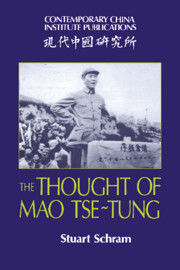Part 2 - Mao Tse-tung's thought from 1949 to 1976
Published online by Cambridge University Press: 23 December 2009
Summary
Like Lenin, Mao Tse-tung, on coming to power, continued to develop his ideas in a context different from that within which he had operated while in opposition. In so doing, he modified, adapted and elaborated positions which he had adopted earlier. In many respects there was substantial continuity, but there were also startling ruptures and reversals and, in addition, Mao struck out in new directions which he had never previously had the occasion to explore.
One important constant in the development of Mao Tse-tung's thought was his concern to adapt Marxism, or Marxism-Leninism, to the economic and social reality of a back ward agrarian country, and to the heritage of the Chinese past, which for Mao was no less real. Prior to the conquest of power, the first aspect of this project involved devising theoretical justifications for attributing to the peasantry a political role greater than that implied by the model of the October Revolution, and more specifically for the strategy of surrounding the cities from the countryside. In this respect, it might have been assumed, and probably was assumed by Mao himself in 1949, that Chinese practice, and Chinese theory, would move closer to that of the Soviet Union.
- Type
- Chapter
- Information
- The Thought of Mao Tse-Tung , pp. 95 - 194Publisher: Cambridge University PressPrint publication year: 1989

